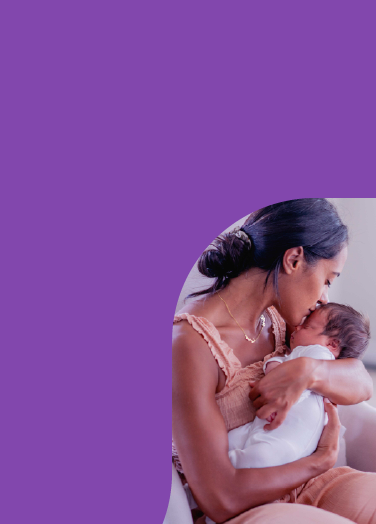The Wellstar difference
At Wellstar, meaningful interactions begin before birth. In the Mother Baby Unit, our team talks with your baby throughout the day—during assessments, diaper changes and even moments in between. These aren’t just conversations—they’re opportunities to build your baby’s brain.
Our team members are trained by Small TALK’s Pediatric Literacy Nurse Navigators to model strong language nutrition, explain its importance and coach you on how to carry these practices into life at home. Our goal is to empower you to feel confident using your voice to support your baby’s development—starting before birth and continuing after you go home.
Here’s how you may see our team engaging with your baby during your stay:
Narrating actions
Team members talk through what they’re doing to help your baby connect sounds with actions. You might hear us say, “I’m getting you all clean! We’ve got to get those toes too!”
Acknowledging feelings
Recognizing your baby’s cues helps them feel seen and teaches that their expressions have meaning. We might say, “I see you’re crying. I know this wipe is cold. I’m almost done.”
Using your words
Our team is trained to avoid baby talk and use complete sentences, instead of made-up words, to support early language development. You might hear us say, “I hear you. I am getting your milk ready now.”
These small acts add up to big impacts. With every word, we’re helping your baby build early connections—to language, to comfort and to you.
We know these early interactions are more than medical care—they’re moments of love, learning and lifelong impact.
Get involved
Even before discharge from the hospital, there are meaningful ways you can begin bonding with your baby and supporting their brain development. These activities may seem simple, but they’re powerful tools for nurturing language and connection.
Narrate your actions
Just like our team, you can talk through what you’re doing with your baby. It may feel silly at first, but it’s an excellent way to build your baby’s language pathways.
“Let’s put on your cozy pajamas. These have dinosaurs on them. Dinosaurs say, ‘Rawr!’”
Talk about anything
Everything is new to your baby, so there’s no wrong topic. Ask them questions, then pause to give them time to respond. Their replies might come as facial expressions, sounds or body movements. This helps teach the rhythm of back-and-forth conversation.
Chat while feeding
“When you’re feeding your baby, talk to them,” said Kim Suber, a nurse at Wellstar Kennestone Regional Medical Center. “Just like when you eat dinner and have conversations, we want to do the same with baby.” Feeding is a natural time for bonding and language building.
“You were hungry, weren’t you? You look calm and happy now.”
Read or tell a story
Whether it’s a favorite book, a made-up tale or even something from your day, stories help your baby learn how language works. Don’t worry if you only get through a few pages—every moment counts.
Limit screen time
The American Academy of Pediatrics recommends no screen time for children under 18 months, except for video calling. Your baby learns best from you, through real-life connection and interaction—not from screens.
Sing together
Babies love high-pitched, sing-song voices. Try singing a lullaby, a nursery rhyme or even a favorite song. Your baby doesn’t care if you’re on key—they love your voice and the time with you.
Soothe with words
Talking through your baby’s emotions builds trust and supports emotional development. It teaches them that they’re safe, seen and supported.
“I hear you. I know you’re sad. I’m right here.”
Language nutrition facts
Words nourish your baby’s developing brain. Engaging your baby in 15 minutes of conversation every waking hour exposes them to up to 2,000 words. That language input builds vocabulary—the foundation for learning to read, think and communicate.
Who should I talk to?
Your baby! They know and love your voice—it’s the one they heard throughout pregnancy. Newborns communicate through eye movement, turning their head, or responding with sounds or cries. These are your baby’s first conversations.
What should I talk about?
Anything and everything. Talk about your day, describe what your baby is looking at, or sing a nursery rhyme you loved from childhood.
When should I talk?
Anytime is a good time. Repetition helps babies learn, and daily routines are rich opportunities to talk. Great moments to engage include diaper changes, feedings, bedtime routines and trying something new together.
How should I talk?
The words you use to communicate with your baby today become the words they will use with you in the future. Use your words and full sentences. Refrain from made up words such as “goo-goo gaa-gaa.” Speak in your home language, the one you feel most comfortable speaking in. Hearing multiple languages will not cause confusion nor delay mastery of the language. In fact, it can strengthen communication skills later.

